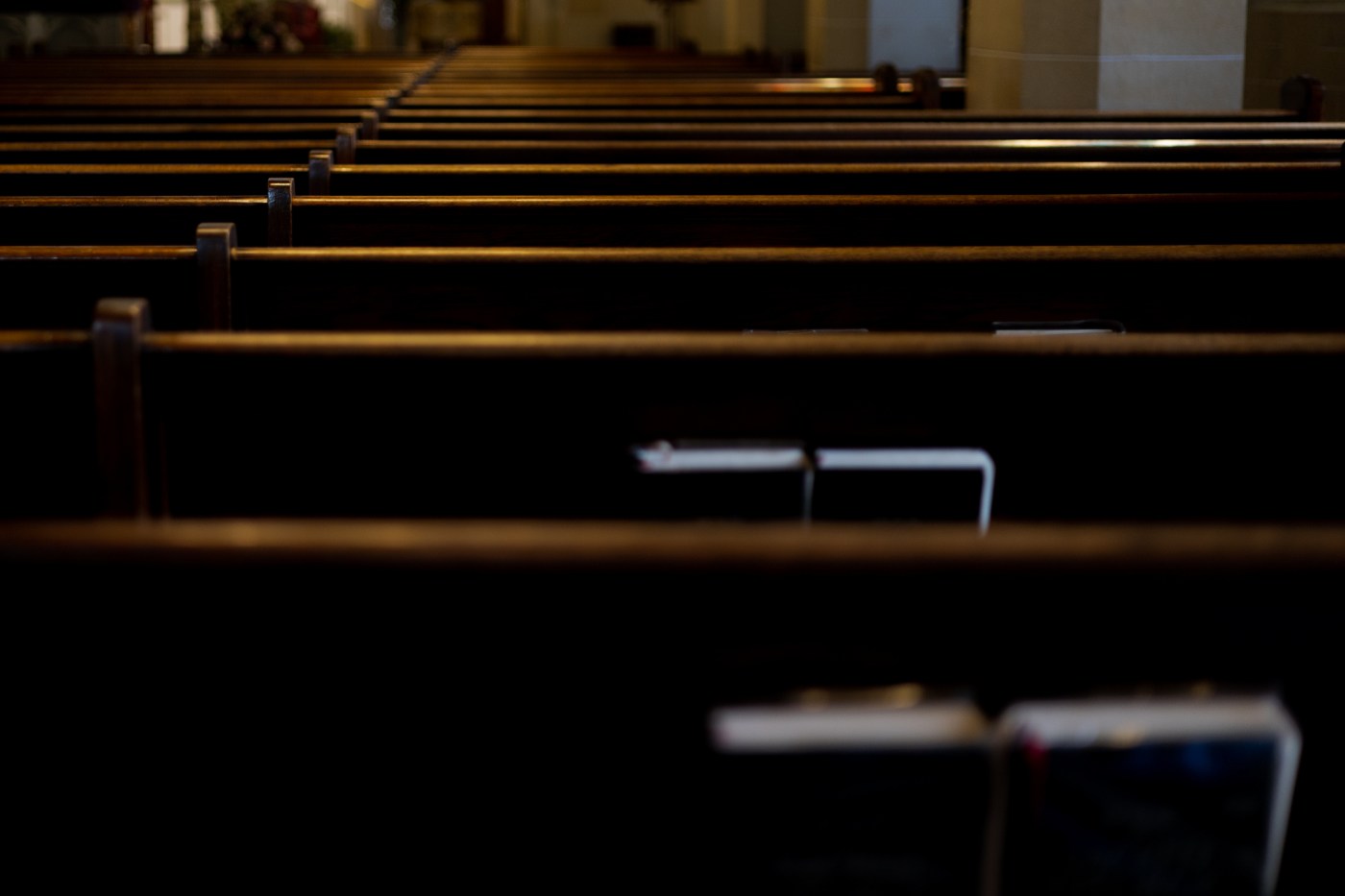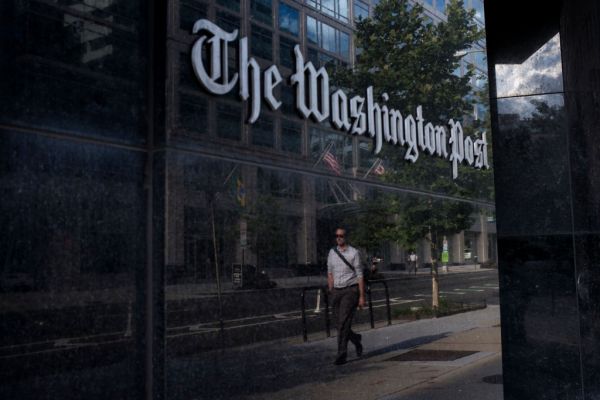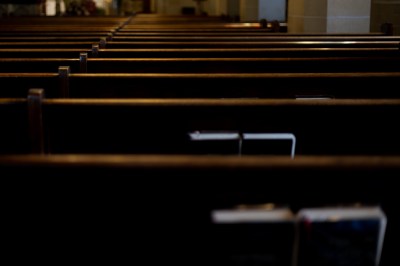ALPHARETTA, Georgia—No cross, plenty of parking. Welcome to North Point Community Church.
North Point is pretty much the model suburban evangelical megachurch. It doesn’t have worship, it has a “live experience.” It doesn’t have childcare, either, but a series of “environments” for the kids: something called Waumba Land for the little ones, Upstreet for the elementary-school kids, Transit for the middle schoolers, InsideOut for the high schoolers. There are bright colors and flashing lights and video screens and all that crap, but the real stuff is in there, too: There’s a lesson on what it means to be “slow to anger” underway. One must not make too much of the packaging.
Still, one notices certain absences—the name “Jesus,” for instance, or anything that would identify the building as one intended for religious purposes.
It is a very easy place—and phenomenon—to mock. There’s a big American flag out front and Chris Stapleton’s “Traveller” on the sound system, for some reason (“Amazing Grace” it isn’t). There’s a lot of Sue Sylvester hair and weird technological mediation (“Scan QR code to learn more about BAPTISM”). Not a single man is wearing a suit or a tie, but an army of them are marching around in those Hey Dude canvas shoes. And—do my eyes deceive me?—there’s a pop-up shop offering church swag. North Point’s pretty slovenly in a lot of ways, and a lot like a half-ass corporate event center (which, let’s face it, is kind of what it is, at least at one level) in other ways.
But, at the same time, this is—snooty aesthetic considerations notwithstanding—a slice of the better sort of American life, inasmuch as the people who actually get up on Sunday mornings and go to church with their families are, on the whole, a much more squared-away group of people than the ones who are still sleeping off a hangover at 11 a.m. and better-adjusted than a lot of the expensively miseducated types putting their breakfast on Instagram around the same time of day.
There is, for example, noticeably less obesity in the congregation than in the community at large. The people are unfailingly polite and engaging, and their plentiful welcomes are sincerely warm. A recent call for volunteers for community projects produced 5,000 sign-ups, a big number even for a big congregation. If you were an older person and lonely, you’d look forward to coming here every week. And if you are middle-aged and overwhelmed by the responsibilities of parenthood and the practical complications of modernity, this is a place that is very much intended for you. “This place was designed for you,” the announcements insist. And the snoot in me says, “And that’s the problem—if it were designed for God’s glory, it would be St. Paul Outside the Walls, not some kind of ghastly jumped-up Marriott that makes me want to go out to my truck and put on Reign in Blood and huff Gorilla Glue.” The charitable part of me is aware that offering community and practical support is a big part of how the Christian church has done its business since its earliest days. The uncharitable part of me is aware that the same is true of Hamas.
This particular church has a little bit of political valence. It is, among other things, the place where Rep. Marjorie Taylor Greene chose to have herself rebaptized (the first one apparently didn’t take!) after deciding that the Catholic Church, to which she previously had belonged, had been colonized by demonic forces. The town in which it is situated, Alpharetta, is pretty typical of the real American political battleground, in the suburbs. Just to the south, the city of Atlanta shows up on the political maps as blue as can be; to the north, east, and west, rural Georgia gets real red real quick, its sanguinary complexion dotted only by little islands of urbanity such as Athens. Alpharetta is more Republican than Atlanta and more Democratic than the rest of Georgia and the nation as a whole. More than 70 percent of the adult population has a college degree, and the electorate leans very slightly female—typical of other suburban communities that have been shifting from the Republicans’ column to the Democrats’ for a couple of decades now.
When pastor Andy Stanley takes the stage at the early service on Sunday morning, he knows that his congregation’s mind is on the election. He goes right into it: “Next week, we’re going to be faced with a choice.” Somebody whoops, and he smiles and winces at the same time. “Do you know something I don’t?” Everybody laughs. “I think we all can agree that we’re faced with a choice between two less-than-ideal options,” he says. A momentary silence falls over the auditorium, but, it turns out, he’s just doing an elaborate bit. The church has two large auditoriums, and it has been holding services in one of them exclusively while the other was being renovated. With the renovations complete, members of the congregation will have to decide where they want to sit for the “live experience.”
“What did you think I was talking about?” He then frankly acknowledges the upcoming election and relates to his congregation, at least one of whom is audibly disappointed by the fact that he isn’t going to be preaching about that. “Nobody comes to church to listen to my opinion about anything,” he says. Of course, that isn’t really true—he’s a gifted preacher, and like any good professional in his trade, he is anything but a transparent lens through which the Gospel is transmitted. And there’s nothing wrong with that. There’s a reason these people are here, in their thousands, rather than just sitting in a cozy spot with their Bibles on a Sunday morning.
Stanley did address the election earlier in the week, in a video message. “Is it possible to disagree politically and love unconditionally?” he asked. “Jesus thought so. It’s time we do so.” There’s a bit of voguish populism in his message, insisting that “there’s more of us” normal, healthy, patriotic people, “than there are of them,” the fanatical partisans and extremists. “They’re just louder.” And we—“normal people,” you know “We the People”—are busy. “The reason the far left and the far right leverage fear is because it works, if we let it. So don’t let it. The sky is not falling. There’s a way forward. There’s a way through. But it will require something of all of us. … I’m convinced that the way of Jesus is the way forward and the way through.”
As with the church itself, what one makes of that is going to depend, to some extent, on one’s priors. A counsel of moderation and enlightened priority-setting is not the worst thing I’ve ever heard come from the mouth of a preacher. But I also think of Michael Jordan’s explanation of why he didn’t use his great celebrity in the service of Democratic politicians with whom he sympathized: “Republicans buy sneakers, too.” It’s not that North Point is a business, exactly—not in the ordinary sense—but it does have a very pronounced sense of customer service and much that has the stink of marketing about it.
About the politics, though: There’s an impression out there—it might be better to call it an urban legend—that these evangelical megachurches are packed to the rafters with Trump cultists being whipped into a frenzy from the pulpit. It isn’t the case that that’s never the case. But that simplistic account doesn’t really get at the truth of the phenomenon represented by North Point and other churches like it. It is a lot more complicated than that.
Here’s a theory: Trumpism, like political populism of other stripes, results from the same forces that have shaped megachurch-ism, or whatever it is you want to call what’s been happening at places such as North Point. With all due respect to Max Weber, there’s an excellent argument that capitalism created Protestantism rather than the other way around. With the decline of the feudal system, particularly in England and in Holland, a class of people who previously had been almost entirely tied to the land, living lives almost entirely determined by the decisions of other people, suddenly had something they never had had before: choices. The return of things like trade and the money economy at the end of the feudal period left the people who had been serfs in a considerably better material condition than they had been as bound agricultural laborers, and—here’s the part worth remembering—they hated it. As Michael Oakeshott observed of certain of their modern counterparts, they experienced their newfound individuality and freedom not as a liberation but as a burden. What followed was a series of political and religious revolutions.
Our own case is roughly parallel. What we have all agreed to call, for lack of a better term, “globalization” has made us radically richer and more free—and we hate it. People who never knew the actual drudgery and depression of decades of unremittingly bleak and repetitious factory work nevertheless long for the days when that kind of career was an option, when they could go down to the factory, get a job, and, like their serf forebears, be relieved of having to think very much about that sort of thing ever again. In the more charitable reading, people with skills, education, and an entrepreneurial sensibility get a lot more out of globalization—and not only economically—than do people for whom working in 20 different jobs in 10 different cities over a few decades feels like torture however well it pays.
Our differences are less about economic theory than they are about sensitivity to anxiety, appetite for risk, and desire for social and geographic fixedness. There isn’t anything inherently inferior about preferring security to opportunity, or predictability to possibility. But there are economic and social costs associated with that kind of sensibility, and having to pay these costs has left a lot of people bitter and, beyond that, bewildered. The world seems to be out of control—which, of course, it is, and always has been, and is supposed to be.
Anxious people want to be comforted. They want something to hold on to. I know religiously conservative Catholics who enjoy listening to Joel Osteen’s sermons, not for the theology but simply for the encouragement. And if churches like North Point emphasize that part of the Gospel more than they do “take up your cross and follow me,” then there’s a good marketing case for that. Perhaps there is room in Christendom for that kind of project, too.
“Political and ideological alignment are not required for us to love each other,” Stanley says. His words will bear repeating tomorrow.







Please note that we at The Dispatch hold ourselves, our work, and our commenters to a higher standard than other places on the internet. We welcome comments that foster genuine debate or discussion—including comments critical of us or our work—but responses that include ad hominem attacks on fellow Dispatch members or are intended to stoke fear and anger may be moderated.
With your membership, you only have the ability to comment on The Morning Dispatch articles. Consider upgrading to join the conversation everywhere.